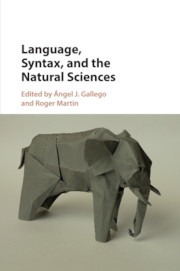Book contents
- Language, Syntax, and the Natural Sciences
- Language, Syntax, and the Natural Sciences
- Copyright page
- Dedication
- Contents
- Contributors
- Acknowledgments
- Introduction
- Part I The Computational Component
- Part II Interfaces
- Part III Linguistics and Other Sciences
- 14 My Head's in Knots: On Uriagereka's Generalization and the Knot-Sentence Connection
- 15 (Neural) Syntax
- 16 Syntax and Uncertainty
- 17 The Golden Phrase: Steps to the Physics of Language
- 18 Science, Mind, and Limits of Understanding
- Index
- References
18 - Science, Mind, and Limits of Understanding
from Part III - Linguistics and Other Sciences
Published online by Cambridge University Press: 02 October 2018
- Language, Syntax, and the Natural Sciences
- Language, Syntax, and the Natural Sciences
- Copyright page
- Dedication
- Contents
- Contributors
- Acknowledgments
- Introduction
- Part I The Computational Component
- Part II Interfaces
- Part III Linguistics and Other Sciences
- 14 My Head's in Knots: On Uriagereka's Generalization and the Knot-Sentence Connection
- 15 (Neural) Syntax
- 16 Syntax and Uncertainty
- 17 The Golden Phrase: Steps to the Physics of Language
- 18 Science, Mind, and Limits of Understanding
- Index
- References
Summary
- Type
- Chapter
- Information
- Language, Syntax, and the Natural Sciences , pp. 351 - 362Publisher: Cambridge University PressPrint publication year: 2018



